The appeal of the island of Patmos does not dwell only on its Chora, a magnificent whitewashed village dominated by the Monastery of St. John the Theologian. It also lives in its secluded hermitages, solitary churches, and green landscapes.
Whether you are interested in religious tourism, historical landmarks, or magnificent beaches, Patmos is an island made of variety. In this article, we give you all the details for visiting the Patmos Monastery of St. John and other religious centers on the island.
Posts include affiliate links to products or services. I might earn a commission if you make a purchase.
Patmos Monastery of St. John
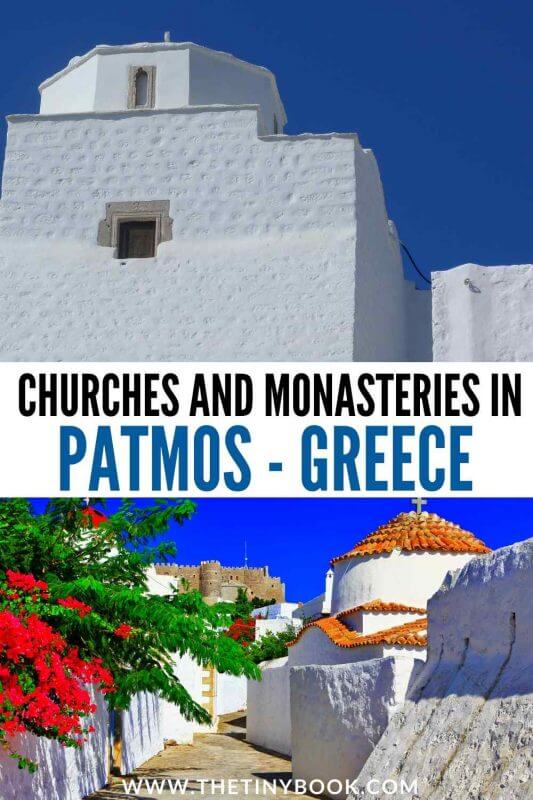
🧿 PLANNING A LAST-MINUTE TRIP TO GREECE?
Be sure to book accommodation and tours in Greece ahead of time to ensure availability!
🛥️ Book ferry tickets with Ferryhopper.
🛌 Find hotel deals on Booking.com.
🚘 Compare car rental prices with Discover Cars.
Are you interested in discovering the Patmos Monastery of St. John and other remarkable churches on the island? Then you’ve just landed on the right site. Take a look!
Hermitages, Religious Caves, and Monasteries in Patmos
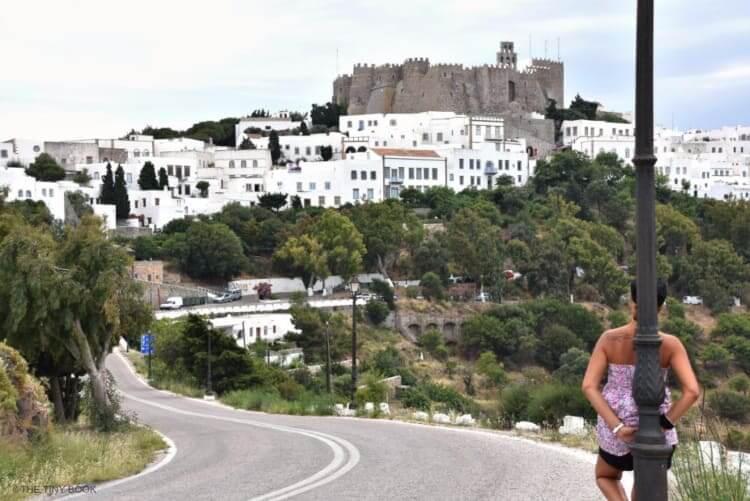
Religion and closeness to God seem to be the critical mindset if you visit Patmos. The same as Crete is the island of the Minotaur, and Patmos will be the island of St. John.
So, let’s get ready to visit the island’s significant religious monuments that attract thousands of pilgrims worldwide every year.
It is not without reason that Patmos, also known as the island of the Apocalypse, is one of the most visited Christian places of worship in Europe

Also called the Jerusalem of the Aegean, Patmos has wisely managed to limit the assault of massive hordes of tourists that can be found on more popular Greek islands.
There are many more things to do in Patmos besides focusing on its religious side. You will find thrilling walking paths, an exciting gastronomy, and some truly gorgeous beaches on the island. With a mild climate and relaxed vibe, Patmos is an excellent destination if you’re looking for an alternative vacation on the Greek islands.
Patmos Monastery of St. John the Theologian

This stone giant oversees Patmos in silence. It was built on the ruins of a Paleochristian church over the ruins of a pagan temple. Looking more like a medieval fortress than a monastery, you will spot the monastery on the horizon long before docking at the port in Skala.
Its austere profile incites awe mixed with a tip of constraint. Yet, it remains a mystic promise of the grace sheltered on the island. Immediately down the dark walls of the fortress, you will see the white landscape of Chora.
Declared a UNESCO World Heritage Site, Patmos Chora cascades down from the top of the hill, contrasting St. John Monastery’s grey facade.
Inside the Monastery

Once past the imposing entrance gates, the narthex appears as the vibrant heart of the place adorned with colorful flowers.
The main church shows a golden wood iconostasis and a magnificent fresco of Christ Pantocrator.
Enchantment goes on with a visit to the museum, which houses historic manuscripts and liturgical valuable objects.
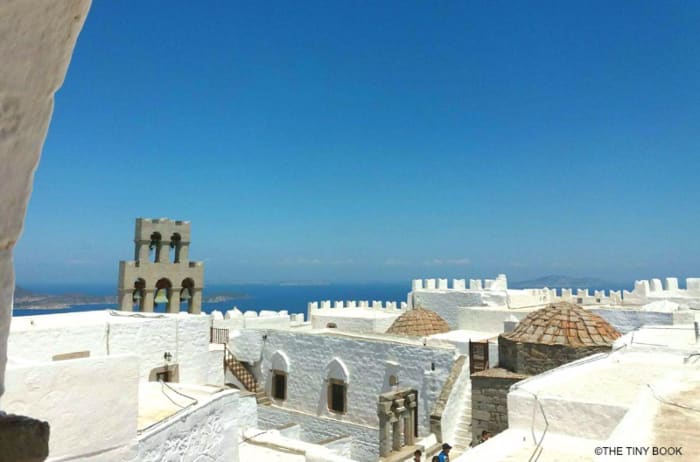
Then, there is the library, one of the greatest of Orthodoxy, sadly not open to the public.
Its immeasurable value lies in the manuscript codices (some of them are papyrus) and in over 13,000 documents related to the history of the monastery and the island.
The oldest, the “Purple” code, dates back to the 6th century.
The Holy Cave of the Apocalypse

The Orthodox tradition has defined Patmos as Theovadis, which means Walked by God. The island’s spiritual center is the Cave of the Apocalypse, a sacred grotto where John the Evangelist lived while in exile in 95 AD.
Christian tradition says that John the Evangelist was John the Apostle, a historical figure, one of the original twelve apostles.
During his exile in Patmos, John is said to have had a Revelation that inspired the Apocalypse, or Book of Revelation. For the sake of precision, however, and for many scholars, this is still a matter of debate.
An inscription at the cave entrance, around which a chapel was built, gives a fair warning: How terrible is this place! This is no other but the house of God and the gate of heaven, a quotation from the book of Genesis [28:7].

The cave’s interior, as narrow as it is, shines with golden icons and candle holders. There is a subtle fragrance of incense that pervades the atmosphere.
And almost as carved on the rock, it is still possible to see the triple crack made by God when he spoke to John.

Should the austerity of the place become too oppressive, it is enough to let your eyes escape through the chapel’s windows.
The candid domes mix with deep blue skies. Everything looks peaceful and serene.
Hermitage of Prophet Elias
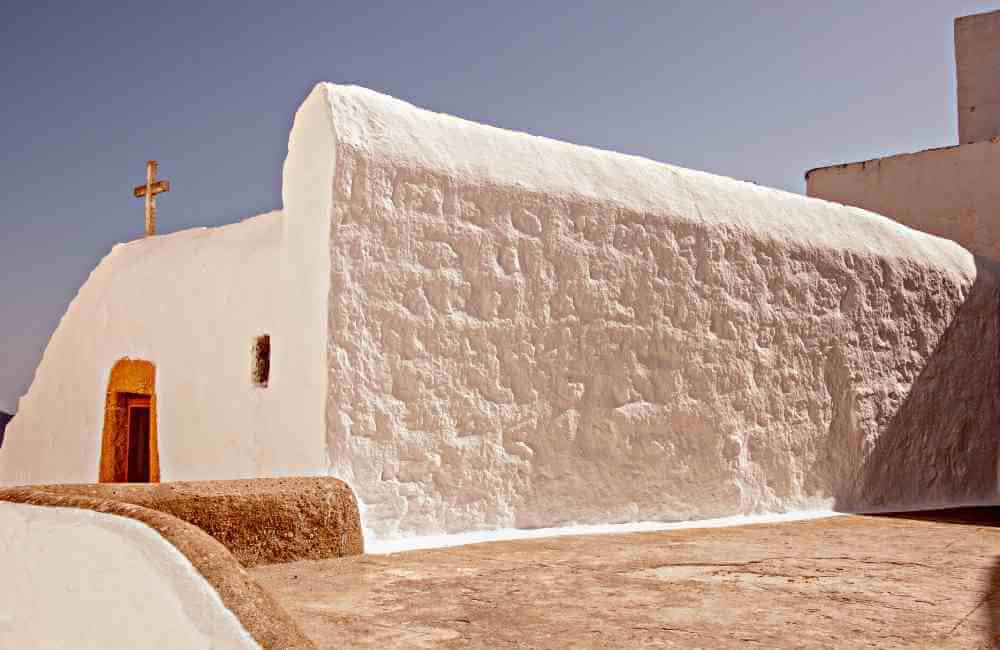
Both the Holy Cave of the Apocalypse and the Monastery of Saint John reveal the most sacred face of the island. However, they are not the only holy places you can visit.
Patmos has as many churches, chapels, and worship places as you can expect on such a sacred land. Among Patmos’s most beloved holy seats is the Hermitage of the Prophet Elias, which proudly stands 269 meters above sea level.
Almost on every Greek island, there is a place called Prophet Elias. This toponym indicates the highest of places closest to the sun.
On this island, there is also a spiritual Zenit. Even when it is hard for visitors to find the place open, the hike to the area is well worth the effort.
You will reach the entrance gate after a winding flock of stairs. There, the horizon opens boundlessly in every direction you look. Blue skies and cobalt seas are in clear contrast with the whitewashed walls of the shrine.
Evangelismos Monastery
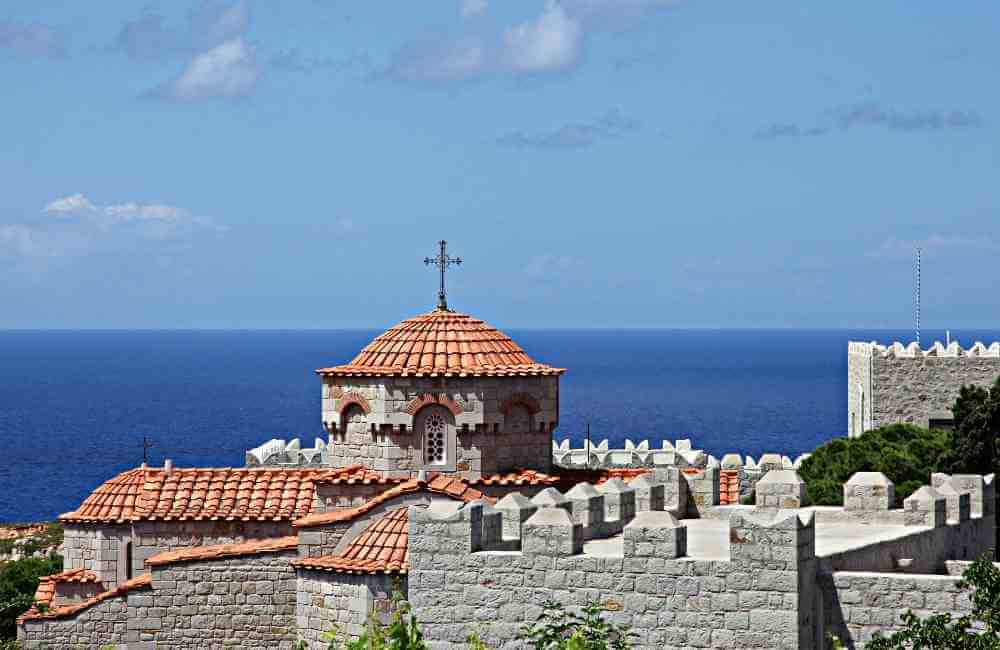
Patmos is also home to three female monasteries. One of them is Evangelismos, the Holy Monastery of the Nuns of the Annunciation. The convent was renovated in 1613 and dedicated to Luke the Evangelist.
Like many of the monasteries on Patmos, Evangelismos resembles a fortification more than a church of the Aegean. The complex dominates the bay of Kipos (Garden) or Kipi to Hosiou (Gardens of the Blessed One).
It houses the Church of Evanghelistrias and a chapel inside a tower. Gardens full of blossomed flowers, frescoes, and icons invite a pause to admire the landscape.
The sisterhood is home to over 40 nuns who dedicate their lives to gardening, beekeeping, and prayer. Their most curious activity, though, is an embroidery technique of the Byzantine tradition that goes under the name of spitha (spark).
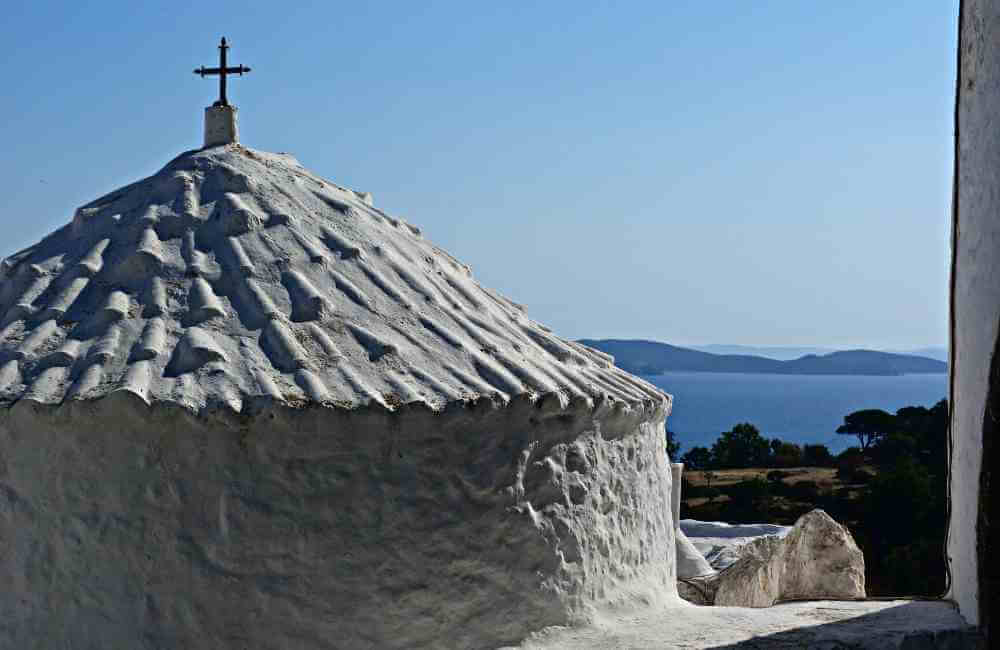
Although Patmos Monastery of St. John is the most stunning religious building you’ll see, the landscape of the whole island is covered with stunning little chapels, white churches, and beautiful domes. They will surprise you as you explore lesser-known areas, lonely beaches, and mountain trails.
Remember: If you visit any of these sacred places, dress according to the character of the places. Avoid shorts or miniskirts; prefer a long dress and a light scarf to cover your shoulders.
How to Get to Patmos
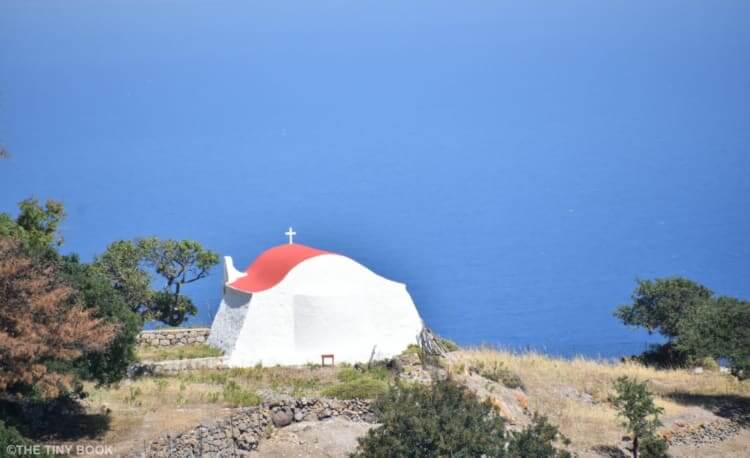
There’s no airport in Patmos, so if you fly from Athens, count on landing on the neighboring islands of Leros, Kos, or Rhodes.
There are daily boats bound for Patmos. All boats depart from Piraeus (leaving Gate E1). In summer, there is also a frequent service connecting Patmos to Kos.
To move around the island, rely on taxis, buses, or the comforts of car rental services. Many people choose motorbikes and quads, too.
Where to Stay in Patmos
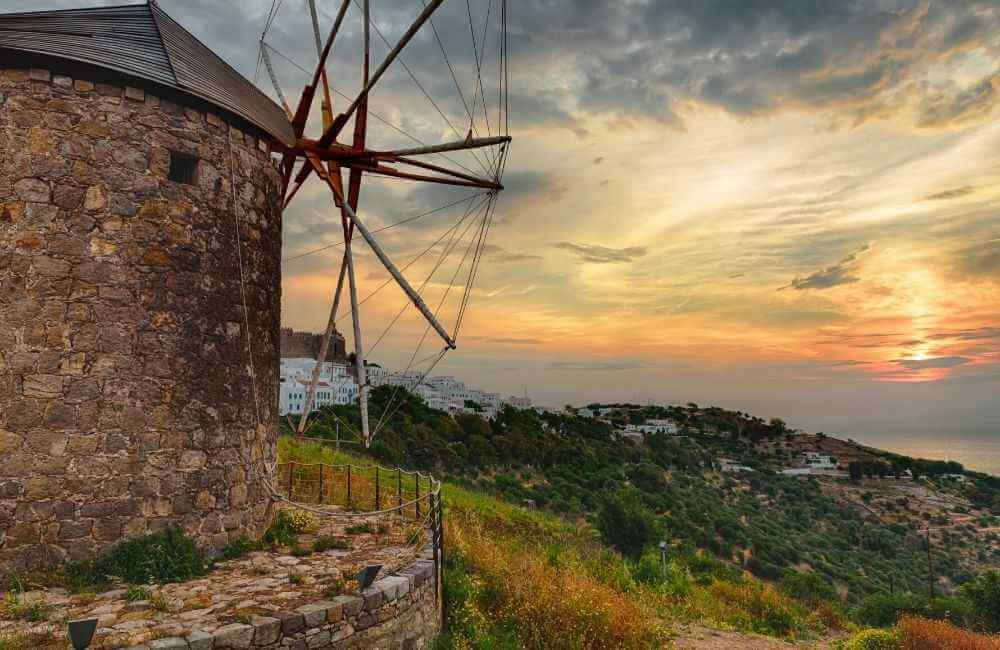
If you’re looking for a place to stay on the island, check out this Patmos Hotels article for options in every area, or check out this box with a quick reference to the best hotels in Patmos.
🛌 Suggested Accommodation in Patmos
- Byzance Hotel
- Skala Hotel
- Eirini Luxury Hotel Villas
- You can also check out the best Airbnbs in Patmos.
Thanks to the Municipality of Patmos, the Patmos Tourism Committee, and local venues and residents for the help and hospitality offered during our trip.
Read more about Patmos
- Where to Stay in Patmos: Best Areas and Top Patmos Hotels!
- The Most Gorgeous Airbnbs in Patmos for a Dreamy Vacation in Greece!
- Sublime Things to Do in Patmos, Greece, for a Relaxing Vacation!
Pin This Great Guide to Patmos Monastery of St. John for Your Next Trip!
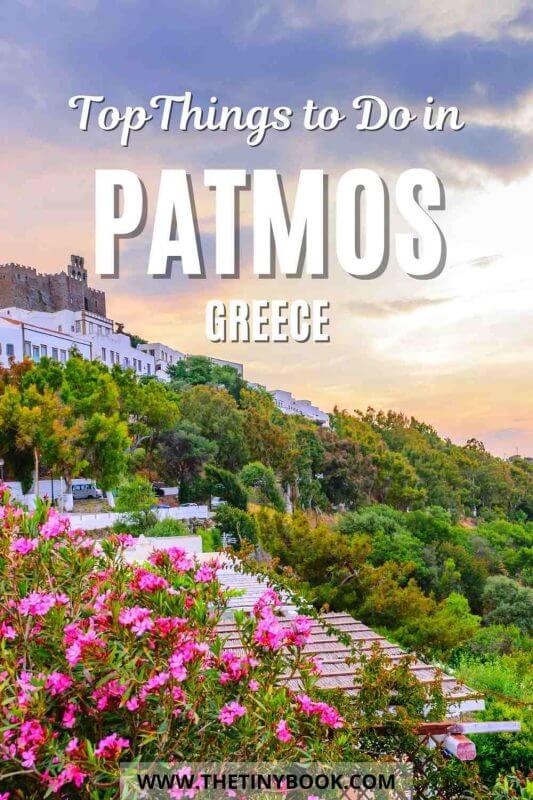
About me:

I have lived in Chania, Crete, since 2016. As a local, I have an intimate knowledge of the island. I host culinary and concierge tours and experiences in Crete and write about the island for several travel media. During the last five years, I have helped many travelers plan the perfect holiday in Crete. I co-authored DK Eyewitness Top 10 Crete and had more glasses of frappe than any regular person could ever handle.

